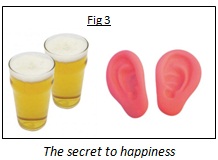The first step is checking to see whether you are actually dead and not just a bit hung-over. If you have no pulse, or there are large holes where any major organs should be, or you have an unnatural desire to chew on human brains (fig 1) then you are dead. CONGRATULATIONS! Acceptance is the first part of coping with your death.
Unfortunately, there is one problem that often faces dead people; they are buried in a thick wooden coffin under a good deal of fairly stiff soil. If this doesn’t apply to you, due to wishes of being cremated or stuffed-and-preserved so you can take centre stage in the living room once more, then feel free to skip this section. Luckily, several graves are fitted with a bell system, wherein you can pull on a string to indicate that service would be quite pleasant right now. However, people often either blame the bell’s ringing on the wind, or faint from fright when there is no wind. Due to the selfish nature of mankind, it looks like you’re going to have to get out of this pickle yourself. Thankfully, it appears that dying can actually be good for one’s health; it is widely known that, along with little old Italian ladies, the dead possess super-human strength. So, using a bit of ingenuity and uber-strong dead muscles, you should have shuffled out of your grave in no time.
When you are back on the surface, you’ll encounter several more problems, namely the fact that plucky groups of desperate survivors, or even the army, will try and shoot you. This is why you should always carry a certificate proclaiming the friendliness of your deadness, and remember not to chew on too many people.
Your next worry may be that you will be unable to find a suitable job. However, there is no place in today’s modern, progressed society for the awful prejudice that can be held against someone simply because they are dead. Just some of the fun, rewarding jobs that a differently-alive (to use the politically correct terminology) person can hold are shown below (fig 2)
Now that you’re dead, your social life is going to be quite different. Primarily, this will be due to the fact that sooner or later, you’ll stink like the rear-end of a rotten skunk. To mask this, there are plenty of perfumes, deodorants and colognes out there to hide your smelly shame. A further issue is that some of your friends won’t want to see you any more, on account of you being dead. In this case, they’re not your true friends, and maybe chewing on their brains a bit won’t go amiss. Also, you’ll be able to gain a lot of new friends by performing novelty bar tricks, such as juggling your own ears. Nothing wins people over like self-mutilation, cheap clown acts and a couple of pints of lager. (Fig 3)
Overall, the secret to coping with being dead is to embrace your un-life, but not let stereotypes dictate whatever you do. Show off your new found talents, but never go too far and cross the line of causing a virus outbreak and national panic. That would just be selfish.

















